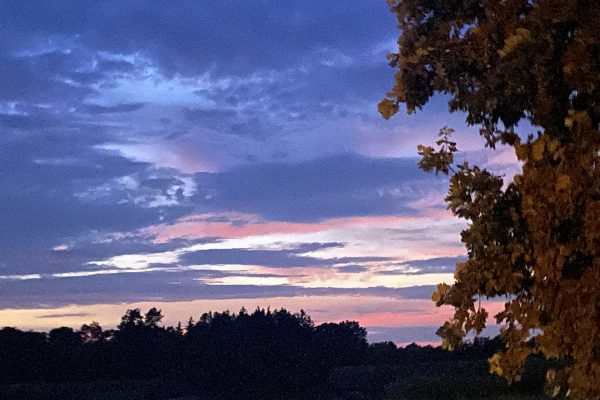Many years ago someone commented to me that I didn’t always say “thank you” when it might have been appropriate. I was shocked and embarrassed. I was convinced I was grateful. But, for some reason, I didn’t necessarily voice or show my gratitude. And that, understandably, didn’t go down well. Over the years, I have tried to be more aware, and to do something about this. And it’s made a difference, not just to others, but also to me. I think—at least, I hope—I have become more grateful, and more aware and respectful of the positive difference that other people make to my life. And I am grateful to that person who all those years ago switched me on to this.
How does this idea of gratitude fit with day 7 of counting the omer, and the quality of malkhut in hesed (sovereignty in lovingkindness)? Below are five thankfulness practices (including a chant) in response to that question.
Shefa, the abundant flow of life and goodness from God, is a core concept in kabbalah. Also known as or, “light,” shefa is poured into Creation, represented by the ten sefirot on the Tree of Life, so that everything is animated and sustained by it. This flow of creation, life, and sustenance is God’s hesed visibly in action. This shefa/or arrives eventually in malkhut (“kingdom”), the world that we experience. The world, malkhut, recipient of that “flow/light,” is God’s “throne.” Malkhut is the aspect of the Divine that is most immanent, immediate, and present, the Shekhinah, the Divine presence revealed to us. The world around us and the life within us are the grounded, manifest lovingkindness of God—malkhut of hesed.
Our life is not something we receive from God through any kind of “entitlement.” It is a blessing, a gift that is neither deserved nor undeserved. That is reason enough to be thankful. But, if, as I have learned, simply feeling or thinking thankfulness may not be enough, what else can we do?
Thankfulness Practice 1 – Thank God: Modeh Ani
Thank God! It’s easy to forget. But I have found, to my delight, that, with practice, it can become easy to remember. As Jews, Yehudi, our very name comes from the same Hebrew root as todah, “thanksgiving”—we are, literally, “the people who give thanks.” The Rabbis prized gratitude so highly that they taught: “In the future all sacrifices will be abolished, except for the thanksgiving-offering. And all prayers will be abolished, except for prayers of gratitude” (Lev. Rabbah 9:7).
As an alternative to saying the Elohai Neshamah prayer when we wake up, we are taught to recite the prayer Modeh Ani. The word modeh comes from the same root as yehudi and todah, and means “thanks.” So we are the people who say, with our first waking breath: “I thank You, living and eternal Spirit, for giving me back my soul in mercy. Great is Your faithfulness.” I composed my own musical setting of Modeh Ani as a way of anchoring the prayer in my own heart and mind.
The Babylonian Talmud (Gen. Rabbah 14) interprets Ps. 150:6, “Let all souls praise God.” as “For every breath which a person takes they must give praise to the Holy One.” While we usually think of Modeh Ani as being just a morning prayer, the Jerusalem Talmud (Berakhot 4:1, 29b) suggests that we can cultivate gratitude throughout our day. Nowadays, when I feel a moment of delight, I find myself consciously saying a private “thank you” to God, silently when in company, and out loud when I am by myself. Hesed is my open-heartedness toward God; the malkhut aspect of that is to activate my thanks by actually saying it.
Thankfulness Practice 2 – Make blessings and count blessings
The Rabbis extrapolate from Deut. 10:12 (“What does God require of you?”) that we should recite 100 blessings a day (Menakhot 43b). These are said mostly at set times for prayer, and at meal times. But there is a deeper teaching here, that we can choose to cultivate a mindset of constant gratitude, and actively notice things that we can be grateful for. “Who is rich?” the Rabbis asked. “Those who rejoice in their own lot” (Avot 4:1). Another way of saying this is “count your blessings.” And that is not just an idea, but can be an exercise. What if we were to sit down for 10 minutes, and write down everything for which we could be grateful? And what if we were to extend that for a second 10 minutes, and keep writing? And it might stretch our gratitude muscles and give them a good workout if we continued to the end of 30 minutes, and kept listing what we were grateful for. This is recognizing the grounded reality—malkhut—of God’s hesed lovingkindness.
Thankfulness Practice 3 – Thank people
Thanking a person may or may not make an impact on them. But I am not sure that we necessarily thank a person in order to have an effect on them anyway. Thanking is unconditional. We say thank you simply because it is a good thing to do. The etymology of the word “thank” gives us a clue to what we are doing: we are effectively saying, “I will think of you.” To thank is to affirm a bond of goodness between ourselves and our benefactor, and to hold that in our thoughts.
There is also a deeper layer at work here. I previously wrote about seeing another’s face as the face of God. When we thank another person, we also thank God, that force within them that enables them to give to us. God’s indwelling presence malkhut/Shekhinah is present in the other person’s kindness (hesed).
Thankfulness Practice 4 – Make a good day
I have found that thanking God, making and counting blessings, and thanking people have all made a difference to how I experience life. It has helped me stay hopeful, and helped pull me out of the times when I have been down. I think, over time, it has also helped me make some kind of positive contribution to others. Life is not always easy. Sometimes my steps are very faltering. Rabbi Nachman of Bratslav taught: “Every hour of the day, see that you extend and enrich that hour by filling it with extra holiness. Do the same every day of your life. Let each day be filled with more holiness than the day before.” (Likutey Moharan I, 60)
What can we do in the world of malkhut with the life we have been gifted through God’s hesed? Rabbi Ady Assabi (1947–2003), in the siddur he developed in South Africa, wrote the beautiful prayer: “May I make this new day a special day. May I overcome my weaknesses and radiate around me the light of love, care and joy. May my desire for success and attainment not blind me to the needs and wants of others, especially those I love and those who depend on me. May I be able to make during this day, some real time for myself and my family, and some meaningful space for You. Help me to remember throughout the day, that my time is like a scroll; I need only write on it what I want to remember, lest I run out of parchment.”
Rabbi Assabi’s friend, my father-in-law Izzy Wainer (z”l), was renowned for transforming a particular, formulaic, throwaway line into an inspiring one. When he heard someone say, “Have a good day,” he would always catch the person off guard and raise a smile with the reply, “Make a good day!” And he walked his talk; despite having to grapple with some big challenges, he managed to “always look on the bright side of life.” Malkhut in hesed is about bringing more good into the world. I am so grateful for Izzy’s lesson. And having received that gift, I find myself passing it on to others.
Thankfulness Practice 5 – Pay it forward
This brings us to the fifth thankfulness practice. If we are to “fill every hour with extra holiness” and “make a good day,” what might that look like?
There is a curious moment in the Torah, right in the middle of the chapter detailing the laws relating to all the major festivals, including our current season, Pesakh. There is a single, isolated verse that draws attention to looking after the needs of the poor (Lev. 23:22): “And when you reap the harvest of your land, you shall not make clean riddance up to the corners of your field when you reap, nor shall you gather any gleaning of your harvest; you shall leave them to the poor, and to the stranger; I am the Lord your God.” It is a timely reminder, that, when we are on a high, celebrating the festivals and our good fortune, abundance must be shared.
What should we do with the shefa/or, “flow/light,” that we receive from God? We are taught that we are to be or goyim, a “light to the nations” (Isaiah 42:6). Abraham was told by God: “And I will bless you; I will make your name great, and you shall be a blessing” (Gen 12:2). What does it mean to be a blessing? What does that look like? We need to make sure that hesed continues to flow. The bounty that we receive—in whatever form—must be shared, or it will begin to turn sour, and diminish us. Lily Hardy Hammond wrote: “You don’t pay love back; you pay it forward.”1
God is the source of all hesed, but we can channel that hesed in malkhut. Through us, lovingkindness can become tangible. As Rami Shapiro says, we are “the way God writes symphonies and bad checks, … the way God cries over newborns and last breaths, … the way God is God”2 in the world. Malkhut in hesed means that I am master of my own expression of hesed. One powerful way to thank God for what we receive is to “pay it forward,” to offer goodness in whatever form we can.
So, we receive from God the flow of life and goodness. Thank God (modeh ani)! Make and count blessings. Thank people. Make a good day. And pay it forward. By doing all these things, we keep the flow going, and send it full circle back to God.
The audio track, sheet music, and further commentary about Modeh Ani can be found at http://alexandermassey.com/modeh-ani/.
1. In the Garden of Delight, New York: Thomas Y. Crowell Co., 1916, p. 209. “Pay It Forward” is also the title and concept for the 2000 film, starring Kevin Spacey, Helen Hunt, and Haley Joel Osment.
2. Rami Shapiro, Ethics of the Sages: Annotated and Explained, Woodstock: Skylight Paths, 2006, p. 36.











